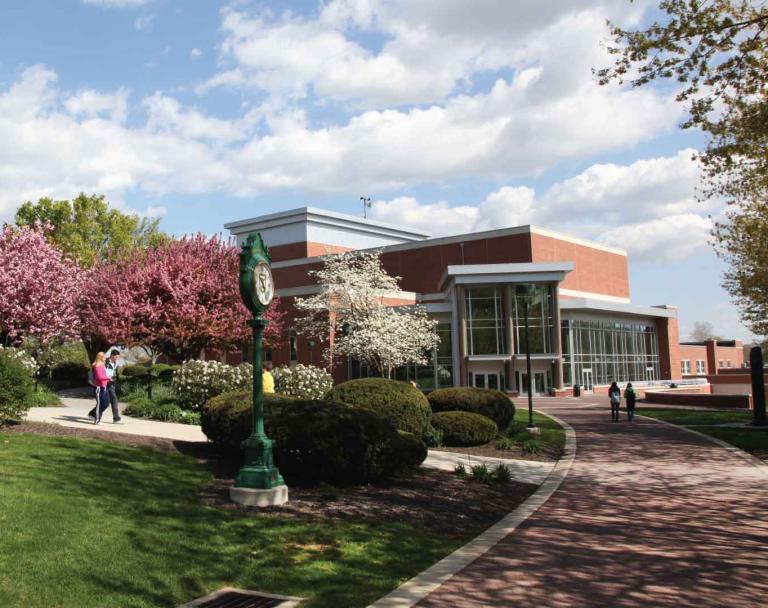Environmental Biology Outreach

- Academics
- Kinsley School of Engineering, Sciences and Technology
- Spotlights
- Environmental Biology Outreach
York College Faculty Members Share Knowledge Through Community Events
Dr. Sean Georgi, Assistant Professor of Biology, and AnaLu MacVean, Environmental Horticulture Instructor, connect their students to an inquiring public.
Walking through Central Market York during the First Friday celebration every April, members of the community might have the chance to handle a human brain.
Dr. Sean Georgi, York College of Pennsylvania Assistant Professor of Biology, began setting up science exhibits at Central Market in 2018 to observe Brain Awareness Week, which occurs in March.
“The goal is to teach people of all ages about the brain through interactive exhibits,” he says.
Breaking down the brain
Besides the brain exhibit, Dr. Georgi uses a set of electrodes that connect to visitors’ arms and allow them to control a mechanical claw. This demonstrates how our bodies generate electromagnetic signals. An exhibit on illusions and another on DNA that involves strawberries and soap offer passersby a hands-on approach to learning more about the brain.
Dr. Georgi is constantly exploring ideas and creating displays for his exhibits. York College students, typically Biology majors, volunteer to share their knowledge at the events.
“That’s the thing that is really rewarding,” Dr. Georgi says. “These students are thinking critically about how to break down college-level concepts to a third-grader level.”
Dr. Georgi and his students also have presented exhibits at local elementary schools.
Exploring the life of plants
Community educational events have proved a big hit for Environmental Horticulture Instructor AnaLu MacVean. While the program is new to her, she has found engaging with the community is a great way for her to dive deeper. MacVean and York College students have worked with Indian Rock Elementary School Science Night to develop botanical activities to share with families there.
“I really enjoy seeing the students take what they learn and put it into simple terms and engage with little kids,” she says. “I also really enjoy when those kids have an ‘Aha!’ moment for science.”
Through this program at Indian Rock, the elementary students learn about the parts of plants and their fruits. They also read books about science and then take part in related activities, such as looking through a dissecting microscope and creating art. At the end of the day, the students get to take home a seed.
Along with Associate Professor of Environmental Horticultural Dr. Tahera Naznin, MacVean’s York College students also worked with Alexander D. Goode Elementary School to alleviate issues with its greenhouse. The Environmental Horticulture students donated plants they had grown in the Horticulture course to the school. MacVean hopes to return next semester to teach on a topic of the elementary students’ choosing.
Being good neighbors
Whether setting up activities at Central Market or a local elementary school, MacVean and Dr. Georgi enjoy seeing the growth in their students and members of the community.
“I believe colleges have a responsibility to be good neighbors to the community,” Dr. Georgi says. “Giving back and engaging people is what it means to be a good scientist.”
Dr. Georgi is on a mission to broaden kids’ concepts about science. Many children, he says, have preconceived notions about who can be a scientist and what a scientist should look like. When they meet his students, they see a wide variety of individuals who love science.
“It gives them additional role models,” he says. “It helps spark students’ interest in science.”
Dr. Georgi’s and MacVean’s students have become better science communicators, with an ability to break down complex concepts into bite-size ideas that a child can understand.
“Being able to communicate scientific principles to the public is important,” Dr. Georgi says. “It’s a great skill set to develop.”
Looking to the future
Environmental Horticulture students plan to work with the Unitarian Universalist Congregation of York on its community gardens, helping to grow and pack food.
Dr. Georgi and MacVean welcome invitations from organizations interested in having York College students share their knowledge and expertise.
“It’s important for people to engage with science throughout your life,” Dr. Georgi says. “If a first-grader can see how exciting it is to learn about the brain, there’s no reason why anyone at any age can’t engage with us.”
“Just be curious,” MacVean says. “If a person is curious, I think everything else will come.”

